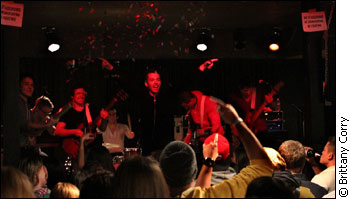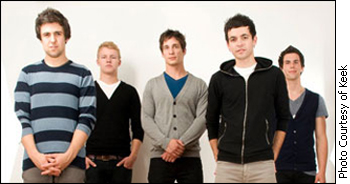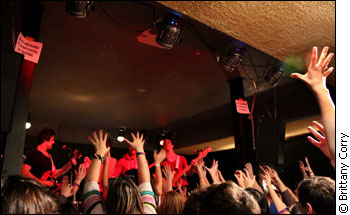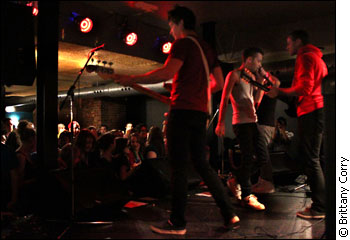Tags
Related Posts
Share This
Music in Ottawa: not dead, not even resting
Ottawa has no local music scene. The venues are small; the crowds are young; the bands always leave for bigger cities. That is what people keep hearing, anyway.

Under a confetti shower, Keek lead singer Conor Whitehead salutes the crowd at an all-ages show at Maverick, in December.
Promoter Peter Roumeliotis moved to Ottawa from Montreal two years ago. “I was told Ottawa doesn’t have a scene,” he says. “But when I got here, I was like, ‘What are you guys talking about?’”
The venues are smaller and the kids may be young, but so what?
“What I’ve realized is that Ottawa’s scene is more intimate. In the pop-punk, metal and hardcore scenes, you tend to get the same 150 to 200 kids that come out to all the shows,” says Roumeliotis.
Roumeliotis, who promoted in Montreal for over a year, says that in a bigger city the crowds are more sporadic. He says it was common to have certain shows draw sparse crowds and was often hard to fill large venues.
So, Ottawa’s local music scene is a steady one, but why?
Venues are smaller here, and the kids may be young, but so what?
A friendlier scene
Alex Brownlee, from the Ottawa-based band Constraints, says a big reason is because your hometown is the place to build your fan base.
“If you’re not liked by the kids in your hometown, chances are people won’t like you in other towns either,” he says, laughing.
Constraints have now started to draw a bigger crowd in the greater Toronto area and have done some bigger summer tours by pairing up with bands in other cities and countries. But Brownlee says it starts at home — it’s all about networking and whom you know, which is why they do so well playing at home regularly.

Ottawa-based band Keek: from left to right, Marek Lubanski, Kyle (Willy) Williams, Matt Belanger, Conor Whitehead and Kyle Megill.
Conor Whitehead of the Ottawa-based band Keek agrees.
“When we started off we could play a show, and maybe 30 people would show up, and they’d all be close friends,” he says. “We go where the kids are; we used to play a lot of high schools and hand out flyers and hop on social networking like Twitter and Facebook, and that’s what really got our fan base going here in Ottawa.”
Keek is a pop-punk band that can draw a crowd of five to six hundred kids, says Roumeliotis. But that’s only possible at an all-ages show — another reason why Ottawa has a thriving scene.
Downtown, places like Maverick, Café Dekcuf and Ritual host all-ages shows. Adam Kronick, the owner and operator of Babylon nightclub on Bank Street, says doing all-ages shows is important for showing support for Ottawa artists.
In Montreal, this is in jeopardy, Roumeliotis explains.
“Basically for smaller shows and for emerging artists in Canada, we had a venue called Underworld, and it was the only venue that would do all-ages shows, for kids who are like 15, 16, 17,” he says. “As of December 31, Underworld’s going to be a bar full time, and that’s going to affect the music scene really bad.”

Alive and kicking. Fans sing along at Keek’s Maverick show.
Roumeliotis says venues are the important thing in a local music scene. In Ottawa, he says, the size of the rooms is perfect: smaller than first-rate music scenes as in Toronto and Montreal, yes. But this is a good thing.
“In Montreal a band like Down With Webster would play Metropolis, which is like 3,000 people; over here they’re going to play Bronson Centre, which is barely 1,000 people, so it’s definitely a more intimate scene,” says Roumeliotis.
Route 401 to Toronto
He says in promoting in Ottawa for the last two years, he has sold out shows much more easily than in large venues in Montreal.
Of course, there are some drawbacks to the intimate Ottawa scene. Brownlee says Constraints do see risks in playing Ottawa regularly.
“There is the issue of over-saturating yourself in Ottawa,” he says. “By playing a show every two weeks, you can go from having people come out and being really excited to a point where they get bored of you. So you have to space out the shows, for sure.”
Whitehead says Keek will eventually leave the city for bigger opportunities but not for lack of the local scene. “Ottawa’s been great to us, and we’ll leave when we’re ready to leave.”

Keek performing. “We go where the kids are,” says Whitehead.
Roumeliotis agrees that Toronto is the inevitable next step for most Ottawa — and even Canadian — bands, in hopes of finding a record label. But local is important.
“I have kind of an unofficial rule with bands, that if you can’t dominate your hometown then I can’t see you dominating any other city,” he says. “All the bands that are big right now can do ten times as many people here than by going to another city.”
So if the venues are smaller, and the kids are young, and the bands are leaving for bigger cities, why would that mean the local music scene is dead? Local bands are building a huge fan base and a name for themselves, and Roumeliotis says the small-town city of Ottawa has much to offer.
“Ottawa just has a smaller scene, but it’s a great scene, and it’s definitely still alive.”





